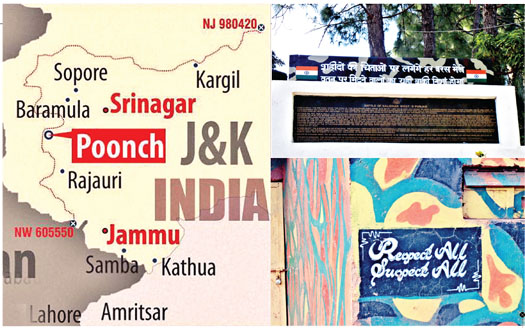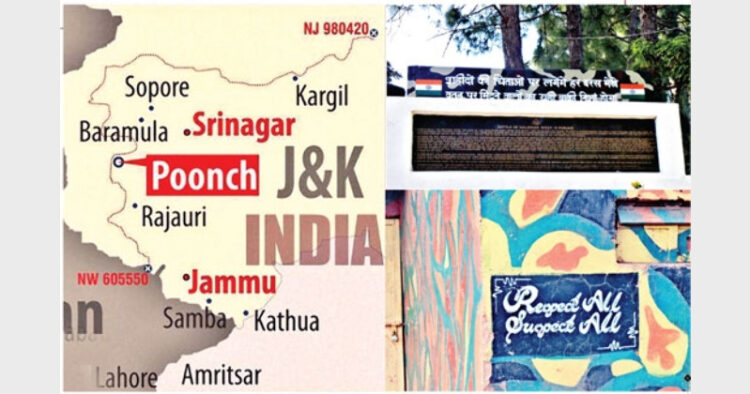 Intro: “Respect All. Suspect All.” This is written on a
Intro: “Respect All. Suspect All.” This is written on a
mountainside near an Indian Army post in Poonch. And it seems to be an apt advice to army men who guard the mountainous stretch of India’s border with Pakistan–the Line of Control (LoC).?
Tough terrain, dangerous enemy and harsh weather conditions- the Army faces all this and more as it maintains a constant vigil to keep our borders safe. “There are constant challenges. We can never let down our guard,” says a senior Army officer, commanding a forward post in Akhnoor, in Jammu and Kashmir.
Besides guarding the borders in the mountains, the Indian Army has also been managing a relentless counter-infiltration campaign along the LoC and extremely successful intelligence-backed counter-insurgency operations.
From a layman’s viewpoint, this post is beautiful and exciting. The scenic beauty is awesome-a tourist’s dream spot. But as we interact with the Army, we realize life here is anything but fun. Across the mountains are Pakistan Army’s posts. Even during peace time, the Pakistan Army keeps disrupting the silence of the mountains with constant gunfire towards India. Though there is a ceasefire agreement in place, Pakistan never ceases to violate it. The purpose is obvious-helping terrorists infiltrate into Indian Territory.
Officially, Pakistan denies having anything to do with infiltration bids. However, it is understood well by political and military leaders that without the active support of the Pakistan army and the ISI, terrorists cannot infiltrate. Their army mans the mountains and ridgelines while the rivulets and nullahs are heavily mined. Infiltrating groups are obviously guided through Pakistani posts, with adjacent posts providing covering fire for support. After monsoons, the infiltration bids increase every year. This is because once winters set in; it’s close to impossible to navigate some of the snow-covered terrain.
“The enemy is unpredictable. Alertness is crucial. In fact, we can never let our guard down,” the officer points out. “There are times they open fire when you least expect it”, he said.
More than the overt attack, it’s the covert operations by the enemy that have to be monitored constantly. “We have to keep checking the fencing to ensure there has been no attempt to damage it. This is done on a daily basis. One can never predict how, when and where the infiltrators will try to come in.”
During rains, the terrain presents other kinds of challenges. The mountains themselves turn treacherous as landslides can happen anywhere any time.
The unexpected rains that wreaked havoc in Jammu and Kashmir this year triggered numerous landslides in the mountains as well. In fact, as we drove up towards the Army post, we could see the telltale signs of many a landslide. Though there were no floods as such in the higher reaches, the landslides were dangerous in more ways than one. Besides being an immediate hazard for army movement during rains, the landslides tend to cut off the route to the posts. There is usually one secured road that leads to a forward post in the mountains. If this road gets cut off, regular supplies get affected. Engineers of the Army and the Border Roads Organisation are immediately pressed into service to clear the road. When it rains continuously, you can imagine how difficult this can get.
Summers are extremely hot here. Mountain peaks being closer to the sun, the heat and glare can become unbearable during summer months. Winter is another kind of extreme weather-with cold, harsh and, at times, high velocity winds blowing across the mountains. Needless to say, the cold is bone-chilling.
Deadly animals such as leopards, scorpions and snakes (cobras and vipers) also inhabit the mountains. They can be as dangerous as the human enemy, if not more. The monkeys are a constant headache too. We can see several monkeys flitting around on the trees surrounding the Army post. “They are quite ferocious. Their bite can lead to rabies. We try to keep at a safe distance from them,” an army man tells us.
“We need to stay fit to tackle all these challenges,” the commanding officer says. “We keep training ourselves here. We cannot afford to become lax on any front. Besides keeping us alert and fit, training helps keep the motivation levels high among the men.”
The glimpse into the life of our army men posted high in the mountains was both a humbling and a motivating experience.
The Indian Army has been deployed along the Indo-Pak border ever since 1947. Till 1990, the Army was deployed in J&K for safeguarding the LoC and the International Border (IB) as well as for offensive military operations as and when called upon to do so. Then, in 1990, when insurgency in the Kashmir valley erupted and intensified, leaving the police and paramilitary forces unable to handle law and order, the Indian Army was asked to step in. Pakistan had initiated a proxy war in the state by pushing in trained terrorists and foreign mercenaries armed with modern weapons and sophisticated communications equipment.
The Indian Army’s Northern Command, headquartered at Udhampur, controls this sensitive region of the country which covers the entire state of Jammu and Kashmir and contiguous portions of Punjab and Himachal Pradesh. The Northern Command was raised in 1972 to look after defence in this region. Today the command counters the most serious challenge to India’s security-the scourge of terrorism and proxy war in Jammu and Kashmir. Operation Vijay was possibly Northern Command”s finest hour. It was a unique operation marked with unparalleled bravery, guts, determination and sacrifice beyond the call of duty.
Also Read This : J&K Diary: MESSAGE IS CLEAR?
Troops of the Northern Command have been manning the highest battlefield in the world at Siachen. The average altitude of the posts varies from 15,000 to 23,000 feet there. The battle is not just against the enemy but also against sub zero conditions, extreme wind chill, deep crevasses, frost bite and hypoxia. As we started back from the Indian Army’s forward post in Akhnoor, it was clear to us how many comforts each and every army man sacrifices in order to serve and protect the nation. Let us not forget that the Indian Army is the world’s largest volunteer army. There is a provision for compulsory recruitment, but it has never been used. The two larger armies, the Chinese and the Russian, are organized on the basis of compulsory military service.
Overwhelmed with emotion, and as a mark of respect for the entire armed forces, I tied a rakhi to the commanding officer before leaving the post. It was simply a ‘thank you’ gesture – from the people of India to each and every army man.
Abha Khanna Gupta ?(The writer is a senior journalist and social worker)
?
?














Comments